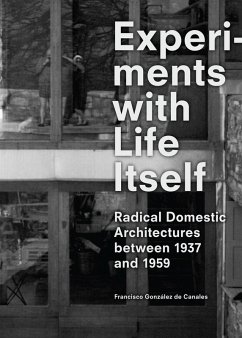Every book relating the history of modern architecture features a large number of pages dedicated to avant-garde designs and the formation of the modern movement in the interwar years, and a similar number devoted to reconstruction and expansion after the Second World War. Meanwhile, as if owing to lack of understanding or convenient silence, there is void of dark years, of wars, exile and misfortune about which little can be said. However, it was in these dark times, as in so many other revealing moments in the history of culture, that experimental and profoundly invigorating experiences were taking place. Architects and artists voluntarily or forcibly driven to the margins of social importance began to react to a culturally unsustainable situation of which we know very little even today. In Experiments with Life Itself, Francisco Gonzalez de Canales studies a series of unrelated cases from the late 1930s to the late 1950s that he refers to as domestic self-experimentation.
Dieser Download kann aus rechtlichen Gründen nur mit Rechnungsadresse in A, D ausgeliefert werden.

